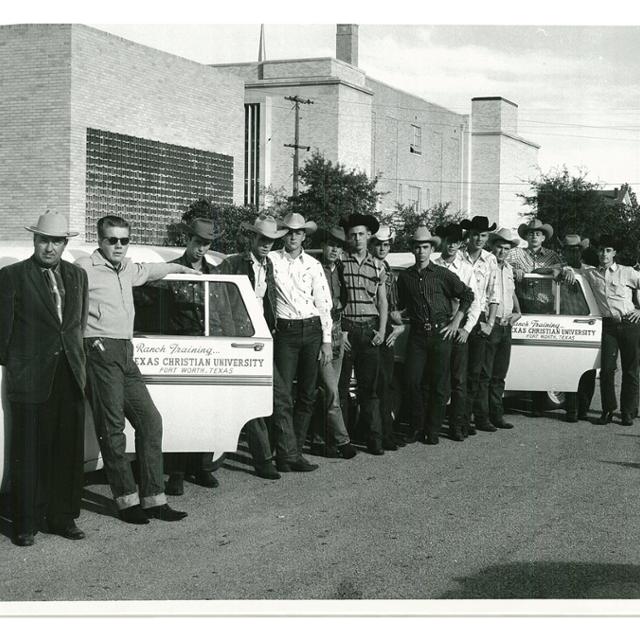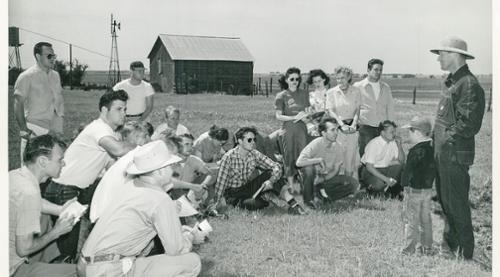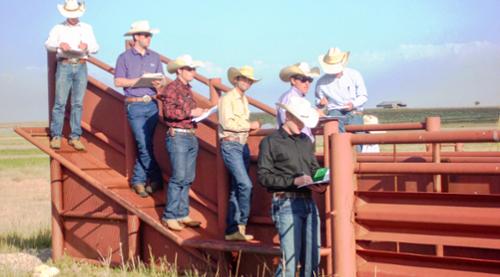Our History

In the early 1950s, a group of ranchers came to TCU to propose the establishment of a special educational program to address the needs of the ranching business. Mr. Charles Pettit, Walnut Springs, Texas, Mr. Roy Parks, Midland, Texas, and Mr. Milton Daniel, Breckenridge, Texas led this group of ranchers. With the support of the Directors of the Texas Southwestern Cattle Raisers Association and other ranchers, this group presented their proposal to Chancellor Sadler who listened to their proposal and agreed to work with them in establishing an educational program to meet their needs. Chancellor Sadler challenged this group to establish funding for the program and to develop the curriculum that they felt was necessary to meet the needs of the students. The Ewing Halsell Foundation of San Antonio made a $50,000 donation toward the endowment of the program. This contribution was followed by others and the program began in the fall of 1956.
Chancellor Sadler hired Mr. Arthur Courtade as the first director of the program and challenged him with the establishment of the program. In formulating the curriculum and criteria for the Ranch Management program, Mr. Courtade was advised by Mr. Pettit, Mr. Parks, Mr. Daniel, along with Mr. Lewis Marshall, manager of the Walsh Ranches, Aledo; Mr. Clyde Wells, manager of the Black Ranch, Granbury; Mr. Bill Roberts, manager of the Flat Top Ranch, Walnut Springs, and others. This group combined their educational backgrounds and knowledge of ranching with proven agricultural practices to establish a curriculum that would address the needs of the modern day ranching business.
 The founders wanted the program to concentrate on beef cattle production, but also
to educate the students in as many phases of the ranching business as possible to
best utilize the natural resources available. The program was developed with the idea
of working closely with successful ranchers to learn from their operations and to
incorporate business practices that are being used on a daily basis in progressive
operations. To best utilize this concept, the curriculum includes visiting ranching
operations and other agricultural businesses to learn from operating managers. These
visits are structured similar to visiting professors except that the students are
going to an on-site classroom. Students receive information from over sixty producers
and professionals during the field trip portion of the coursework.
The founders wanted the program to concentrate on beef cattle production, but also
to educate the students in as many phases of the ranching business as possible to
best utilize the natural resources available. The program was developed with the idea
of working closely with successful ranchers to learn from their operations and to
incorporate business practices that are being used on a daily basis in progressive
operations. To best utilize this concept, the curriculum includes visiting ranching
operations and other agricultural businesses to learn from operating managers. These
visits are structured similar to visiting professors except that the students are
going to an on-site classroom. Students receive information from over sixty producers
and professionals during the field trip portion of the coursework.
At the onset of the program, Mr. Courtade utilized classroom instructors from different areas of the agricultural business to assist him by teaching classes. One such individual was D.V.M. Floyd R. Keen, a large animal veterinarian from Fort Worth. He helped establish the method of teaching classes in 3-hour blocks to match his schedule and observed that the material retention rate of the students increased by the concentration of time on task. At that time, Mr. Courtade began presenting all classes in the three-hour format. Other business professionals were brought in to assist in classes such as record keeping and finance and these lectures were presented in the same manner.
In June of 1961, Mr. John Merrill was hired as the new director of the program. Under the leadership of Mr. Merrill, the program curriculum was expanded from nine subject areas to twelve. Since enrollment is limited and all classes are required by all students, Mr. Merrill added the requirement that the applicants to the program must have ranching experience to be admitted to the program. Each applicant to the program must apply to Ranch Management for acceptance and is required to come to the campus for a personal interview for evaluation of qualifications and dedication to the industry.
As the program grew and funds became available, the University employed more instructors
with the needed skills to teach in the growing program. With the addition of staff,
the program instituted an evening course for the general public. The courses offered
in the evening division were comprised of materials drawn from the curriculum of the
day classes. These classes were offered for individuals that were not able to attend
the full-time classes.
In 1994, Mr. Merrill stepped down as director and Mr. Jim Link was named the third director of the Ranch Management program. Mr. Link had served as an instructor and associate director under John Merrill’s leadership. He led the program onward and upward until resigning in 2005 to head the Grain Inspection, Packers and Stockyards Administration in Washington, D.C.
During the summer of 2006, a national search was conducted for the director position and in August, Kerry Cornelius was named the fourth director of the Ranch Management program. Mr. Cornelius is a 1986 graduate of Ranch Management and holds a Master’s Degree in Agriculture from Tarleton State University. Today the program staff is comprised of five faculty members, one program specialist, and one administrative assistant.
Dr. Matthew Garcia took the role of director of the Ranch Management program and the Southwestern Exposition and Livestock Show Professor in Ranch Management in the fall of 2023. Garcia obtained his Ph.D. in Animal Science Genomics from Washington State University in 2005. He earned his MBA in Innovative Management from Portland State University and his BS in Animal Science Genetics from New Mexico State University. He comes to TCU from Utah State University, where he served as associate department head and associate professor.
TCU's Ranch Management core courses have maintained the basic principles that are utilized in production agriculture. However, the content of the courses is continually evolving as new technology is developed. When new practices or technology is introduced to the industry, the staff carefully evaluates the information, investigates where the practice is being utilized, and determines how to best incorporate the information into the curriculum. In some circumstances, the information is incorporated into fieldwork or with individuals that are utilizing the practices. The technology involved with production, marketing, and diversification of resources has changed significantly since the establishment of the program and will continue to change in the future.
In addition to the certification option, TCU offers a Bachelor of Science in Ranch Management and a Ranch Management Minor through the College of Science and Engineering. The bachelor’s degree recommends students minor in business, a superb combination for managing all kinds of resources. The Ranch Management Minor allows students to pursue a degree in another discipline such as Business, Economics, or Finance at TCU and utilize the certificate program as a minor to meet their graduation requirements. The Ranch Management program will continue to adjust to the needs of the students who are being prepared to meet the challenges facing them as they enter into their careers.
